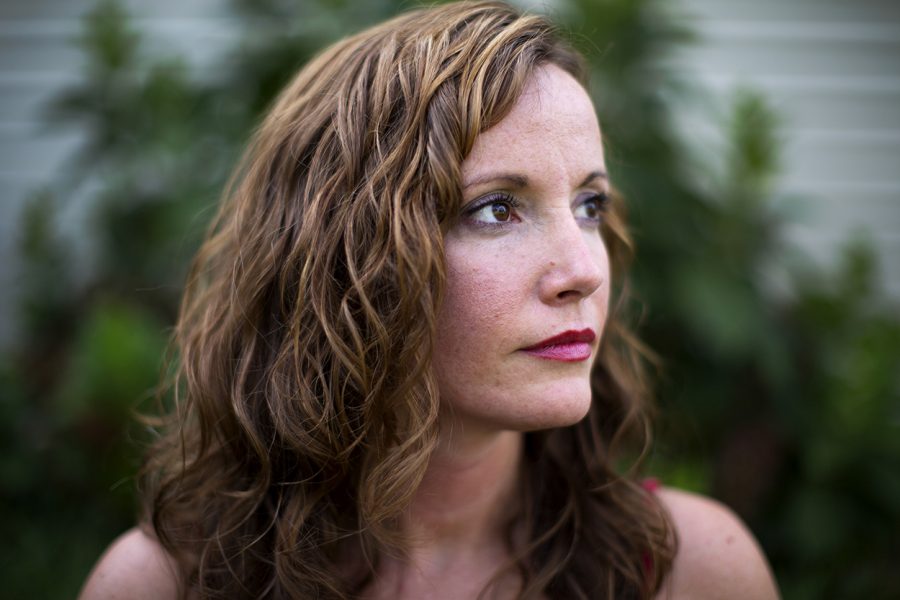Sharing Pa’s Story: WKU employee fundraises for Alzheimer’s cure
September 18, 2013
She will always remember her grandfather as a storyteller.
“He had so many stories. Some of them were true, some of them were not,” Ashlee Tilford said with a chuckle.
Tilford, who graduated from WKU in 2005 and now works as a buyer for the school’s Department of Purchasing, said her grandfather would talk about the time during World War II when he was serving in the Army and received a letter from his young wife.
In a stint of jealousy, she warned him to be good after news of women hired to entertain the lonely soldiers surfaced in the United States. The banter back and forth was hilarious, Tilford laughed, reminiscing about her grandparents.
But as Robert Beasley aged, it wasn’t uncommon to hear the storyteller share the same tales over and over, played back like a broken record.
Now, Tilford’s passion is telling the story of his struggle with Alzheimer’s disease.
“That’s a letter to (Rep.) Brett Guthrie,” she said, reaching for a paper on the edge of her desk. “He actually responded,” she added with a pleased grin.
Her letter, lengthened by pages of pictures, serves as a small portrait of Beasley’s fight, each photo of her grandfather a link in the progression of his battle with Alzheimer’s disease.
Tilford said she hopes the letter and other efforts will help create a congressional alliance in the fight against a disease that is the sixth leading cause of death in the United States, according to the Alzheimer’s Association.
In his response, Guthrie, a republican congressman representing Bowling Green, said H.R. 1507 is a bill that “seeks to better define the comprehensive diagnosis and services for Alzheimer’s disease.”
Tilford said Guthrie later promised to give her letter consideration, should the bill go before the House.
“It’s supposed to change doctor awareness of the disease,” Tilford said. “It’s supposed to put it sort of on the charts as something to be diagnosed, which should then change the way that doctors treat the disease and how educated they are about it.”
The disease is under-diagnosed and therefore, under-treated, Tilford said. But she’s optimistic that H.R. 1507 and other Alzheimer’s legislation will help clear up some of the confusion about the disease, so people can learn more about it and patients can get better, specialized care.
For Beasley, who showed signs of Alzheimer’s disease for 10 years, the memory loss was just a factor in getting old, Tilford said. He was moved to a veterans’ facility in Madisonville, about two hours away from his home in Leitchfield where he quickly deteriorated.
“It was very stressful, very sad,” Tilford said. “But it was expected.”
Beasley’s story echoes those of more than five million Americans living with Alzheimer’s disease, with symptoms of mild confusion mutating into complete non-recognition and paranoia, according to the Alzheimer’s Association website.
“There came a point where he would start calling you the wrong name and then he would realize that he had done it and he would feel very bad,” Tilford said. “You could see that there was moments of clarity amidst the moments of confusion.”
Tilford witnessed firsthand what devastating effects the disease has not only on its victims but their families as well, who wait by bedsides, holding hands, looking for any spark of memory behind the eyes of a loved one who no longer remembers.
“I think it brings the best and the worst out of everybody,” Tilford said. “Same thing with my grandma. We saw her in a state that we had not seen her in. Your grandparents and your parents…you put them up on this pedestal as almost being nonhuman and then you realize they have feelings and emotions. For them, it was a very tense time.”
Watching Beasley’s day-by-day regression inspired Tilford to get involved with the Alzheimer’s Association in 2009. And the loss of her grandfather in 2012 did not dampen her hopes for the future of Alzheimer’s research.
For the fourth year in a row, Tilford will participate in the Walk to End Alzheimer’s.
She’ll be walking for Pa.
The walk is on Saturday and starts at 10 a.m., with registration at 9 a.m.
Tilford is currently the top participant in Bowling Green’s 2013 walk, raising $1,030 — more than any other registered walker.
“It’s always a great feeling,” Tilford said of raising money for the organization. “I believe pretty strongly in how the Alzheimer’s Association allocates their funds. They are not just a fundraising organization. They provide services and support to people that need care and family members as well.”
Walk coordinator Elizabeth Betts, of the Greater Kentucky and Southern Indiana Chapter of the Alzheimer’s Association, said Tilford’s accomplishments are inspiring.
“Having individual fundraisers like Ashlee work so hard to raise those funds just makes it so wonderful to see the passion and the drive of those people in making a difference in the world that we live in, and their funds directly impact the services that we can provide,” Betts said.
Tilford’s story shows just how influential one person can be.
“It’s also so important to other people in the community, every other participant, to see the power of one person — the impact that one person can have on a huge cause,” Betts said.
Tilford has also made an effort to get her family of coworkers involved.
“This is my first year as a team captain, so I recruited several of my friends and co-workers in this building to sign up even if they weren’t going to raise a penny,” Tilford said. “I just was hoping to kind of plant the seed a little bit, get them to come to the walk and see what a great event it is.”
Jenny Castaldo, Tilford’s co-worker and friend, became inspired to walk by her Pa’s story and Tilford’s passion for Alzheimer’s awareness. Castaldo said she gained a grandfather in Beasley regardless of never meeting the man.
“She would always show me pictures and give me an update on how he was doing, and it was almost like he was my grandfather, too,” Castaldo said. “I got to be a part of it even though I didn’t know him, and so when she started getting involved with Alzheimer’s, then I did, too.”
Castaldo says Tilford’s success with the walk doesn’t surprise her.
“When she gets into something like that, she puts her all into it,” Castaldo said. “It’s something very close to her heart and something that means a lot to her, and she’s worked very hard to raise the money and to make more people aware of that.”
Tilford said she remains realistic, noting that a cure won’t be found overnight. But with increased consciousness of the disease, she hopes to see more empathy for its often misunderstood victims.
“I would like to see support and care advanced,” Tilford said. “There needs to be more understanding of the disease and what it means and what these people are going through — more support for them. Sometimes, they just sort of get written off.”
Raising money and awareness in her grandfather’s memory, Tilford is hopeful.
“Somebody like him, he put himself out there at such a young age, and he fought for our country, and he did a lot of things that he risked his life and changed his entire life to do,” Tilford said.
“So now we’re here, and I feel like I’m fighting for him, even though he’s gone, to help other people maybe eventually not have to go through that.”






















![Megan Inman of Tennessee cries after embracing Drag performer and transgender advocate Jasmine St. James at the 9th Annual WKU Housing and Residence Life Drag Show at Knicely Conference Center on April 4, 2024. “[The community] was so warm and welcoming when I came out, if it wasn’t for the queens I wouldn’t be here,” Inman said.](https://wkuherald.com/wp-content/uploads/2024/04/smith_von_drag_3-600x419.jpg)


